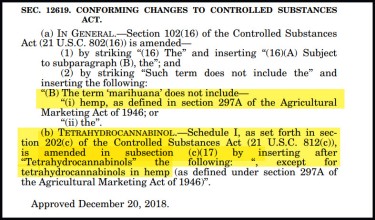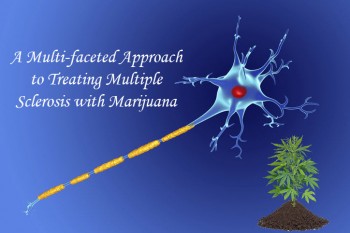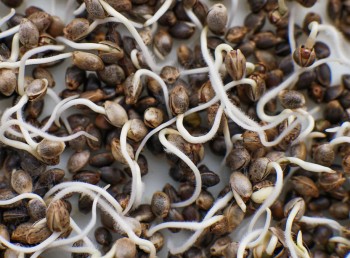
The significant impact of legalizing hemp on our perception of cannabis lies in how it established the definition of hemp. While hemp and cannabis share the exact botanical origin, the 2018 Farm Bill introduced a stringent criterion to differentiate between the two. It set a threshold of 0.3% THC (tetrahydrocannabinol) content, designating plants with less than 0.3% THC as legal hemp and those surpassing this limit as federally illegal cannabis plants.
Cannabis.net called this shot before the homerun in an article called, "Under 0.3% THC by Net Weight Just Created the Biggest Loophole in Drug Law History" back in August of 2022. The devil was in the details as they say with the 2018 Farm Bill facts.
THC is just one of the numerous chemical components in the cannabis plant. The Farm Bill's focus on THC content sparked interest in another cannabinoid, CBD (cannabidiol). This CBD craze reached remarkable heights, with CBD products appearing in various forms, from CBD-infused blue jeans to radio advertisements sounding like enthusiastic Monster Truck rallies.
Although the CBD frenzy may have peaked, it is unlikely to disappear completely. Obtaining some medicinal benefits associated with cannabis without experiencing the "high" linked to THC remains appealing to many individuals.
CBD certainly holds significant medical promise, as recognized by experts like Raphael Mechoulam, the Israeli chemist who initially identified THC. Mechoulam's investigation into the potential impact of CBD on bone density, particularly for conditions like osteoarthritis, is a notable illustration of the increasing enthusiasm surrounding the medical utility of this cannabinoid.
His groundbreaking contributions to cannabis research emphasize the significance of comprehending the active components in cannabis and their connection to our endocannabinoid system. This insight hints at the transformative potential of such knowledge within modern medicine.
However, the issue arises when CBD is indiscriminately added to various products, even those like fried tater-tots, which may not necessarily be the "healthy" choices they're portrayed to be. Mechoulam also advocated for the entourage effect, a concept explained by cannabis scientist Ethan Russo, which highlights that the full therapeutic potential of cannabis is best harnessed when its various chemical components work synergistically rather than in isolation.
An essential subtlety in the discourse surrounding the medical advantages of CBD revolves around the absence of proper regulation within the CBD industry. This situation implies that a product that contains a specific CBD quantity, like 10 mg, might, in reality, contain no CBD whatsoever.
A study carried out in 2022 demonstrated that almost half of the examined CBD products had inaccurate labeling, emphasizing the imperative for enhanced regulatory measures and improved quality control within the CBD market.
The Emergence of CBD and Then Delta-8.
Although we often refer to it simply as THC, the cannabinoid accountable for its psychoactive properties is delta-9 THC. In 2018, the Farm Bill introduced a plant classification as hemp if it possessed less than 0.03% delta-9 THC. This legislative framework paved the way for the emergence of alternative cannabinoids, including delta-8 THC, which is a chemical counterpart to delta-9 THC.
Delta-8 THC products are now widely accessible across the country. They are referred to as products because delta-8 occurs naturally in the cannabis plant but only in small quantities. A chemical conversion process from CBD is employed to produce products with significant delta-8 THC content.
According to a report in The New York Times, there was an astonishing 850% increase in Google searches for delta-8 in the United States between 2020 and 2021. However, research on delta-8 THC remains limited. An earlier study in 1973 suggests that delta-8 THC is approximately two-thirds as potent as delta-9 THC and shares similar effects.
Synthetic Cannabinoids
Synthetic cannabinoids, including THC-O, have also seen a surge in popularity, mainly attributable to the definition of hemp outlined in the 2018 Farm Bill. These cannabinoids are not naturally occurring in the cannabis plant and raise significant concerns regarding potential adverse health effects. In 2022, the California Cannabis Industry Association released a white paper that explored "the risks associated with a nationwide, unregulated market for intoxicating cannabinoids derived from hemp."
Tiffany Devitt, one of the report's authors, explains, "You have cannabinoids that the plant naturally produces, and they may be concentrated during extraction, as seen with THCV, for example. Then, some cannabinoids undergo some processing, like delta-8, which typically involves the concentration of CBD, followed by a process employing solvents and catalysts for alteration.
Finally, there are what I consider fully synthetic cannabinoids, which either do not occur naturally in the plant, like THC-O or exist in such minuscule quantities in the plant that there is insufficient toxicological evidence to deem them safe, as they have not been consumed in significant quantities."
Cannabinoids interact with receptors known as CB1 and CB2 within our bodies. Delta-9 THC, classified as a partial agonist, can only partially stimulate or block these receptors. Devitt expresses concern about the potential adverse health consequences associated with synthetic cannabinoids because they function as agonists. Devitt elaborates on this distinction: "You can envision these cannabinoids as functioning like a dimmer switch. When it's a partial agonist, its impact on stimulating or blocking the receptor is limited, regardless of the dose administered.
To clarify, the disparity between a partial and full agonist can be likened to adjusting a dimmer switch to achieve a slight increase or decrease in light intensity, rather than toggling it to full brightness or complete darkness."
While THCP is a cannabinoid naturally occurring in minute quantities in the plant and, therefore, not technically synthetic, it functions as an agonist. Researchers have reported that THCP is 33 times more potent than delta-9 THC.
Now that Seeds are Legal, What about Flowers?
A recent development in navigating the "it's legal hemp" landscape is the emergence of THCA. THCA stands as the precursor to THC in its acidic form. To activate THC, it necessitates exposure to heat, typically achieved through smoking or baking in the context of cannabis. Legalizing hemp created an opportunity in the cannabis seed market, as seeds are devoid of delta-9 THC.
Similarly, cannabis flowers contain THCA rather than delta-9 THC. THCA only transforms into THC when subjected to the decarboxylation process through heat. Consuming a raw cannabis bud, for instance, will not induce a psychoactive effect. If one were to juice cannabis buds and leaves, the resulting substance would be THCA, which has demonstrated health benefits in its anti-inflammatory properties but does not possess psychoactive qualities.
The regulatory maneuvering within the hemp industry has extended to include marketing flowers labeled as THCA, and indeed, these flowers primarily consist of the cannabinoid THCA. Before you ignited your joint or bowl, the cannabis you consumed was predominantly THCA.
There hasn't been a significant crackdown on the availability of THCA flowers in states lacking a legal cannabis framework, although the possibility of such enforcement measures looms on the horizon. Discussions are underway to refine the definition of hemp in the United States. If these efforts fall short, it effectively means that the legalization of hemp has, in effect, legalized all forms of cannabis. This potential outcome holds substantial significance.
READ MORE ON THE DELTA-8 LOOPHOLE, READ ON...
HOW THE FARM ACT CREATED A HUGE DRUG LAW LOOPHOLE!







